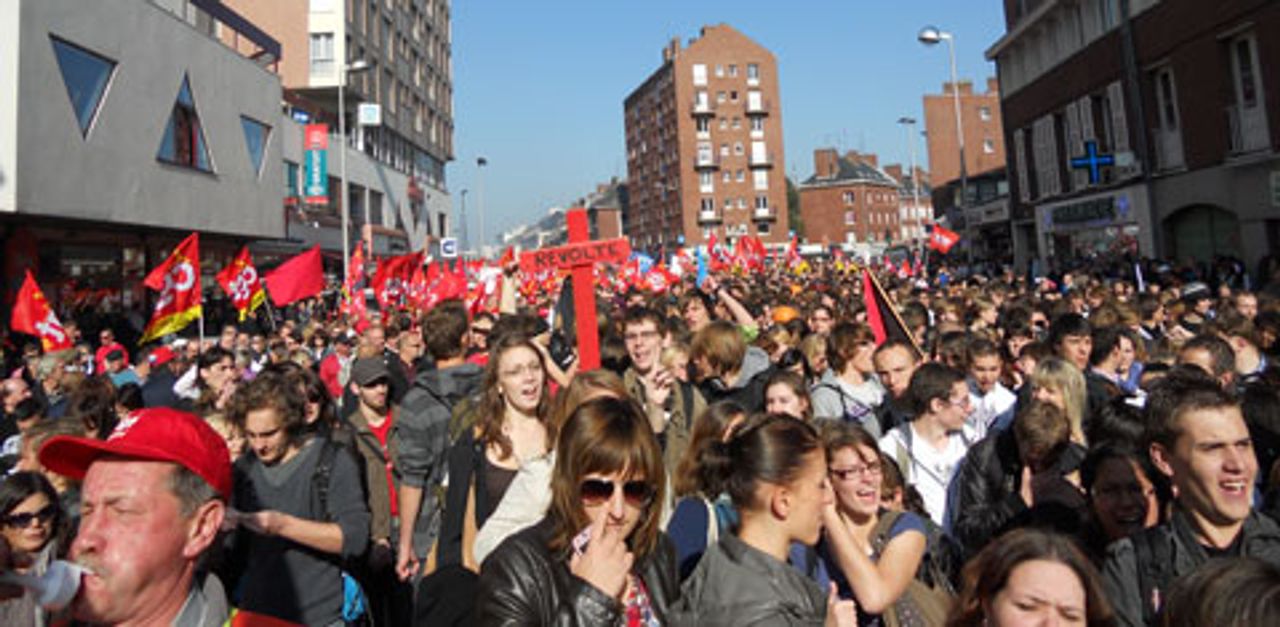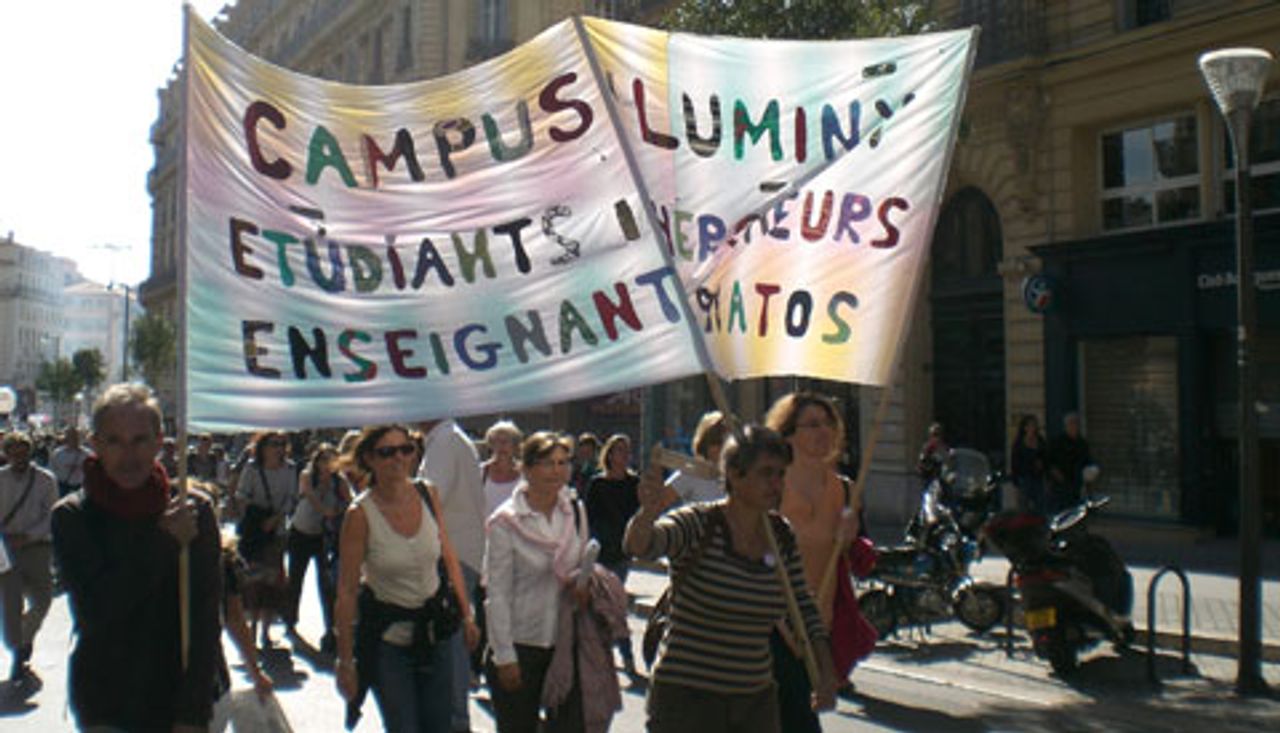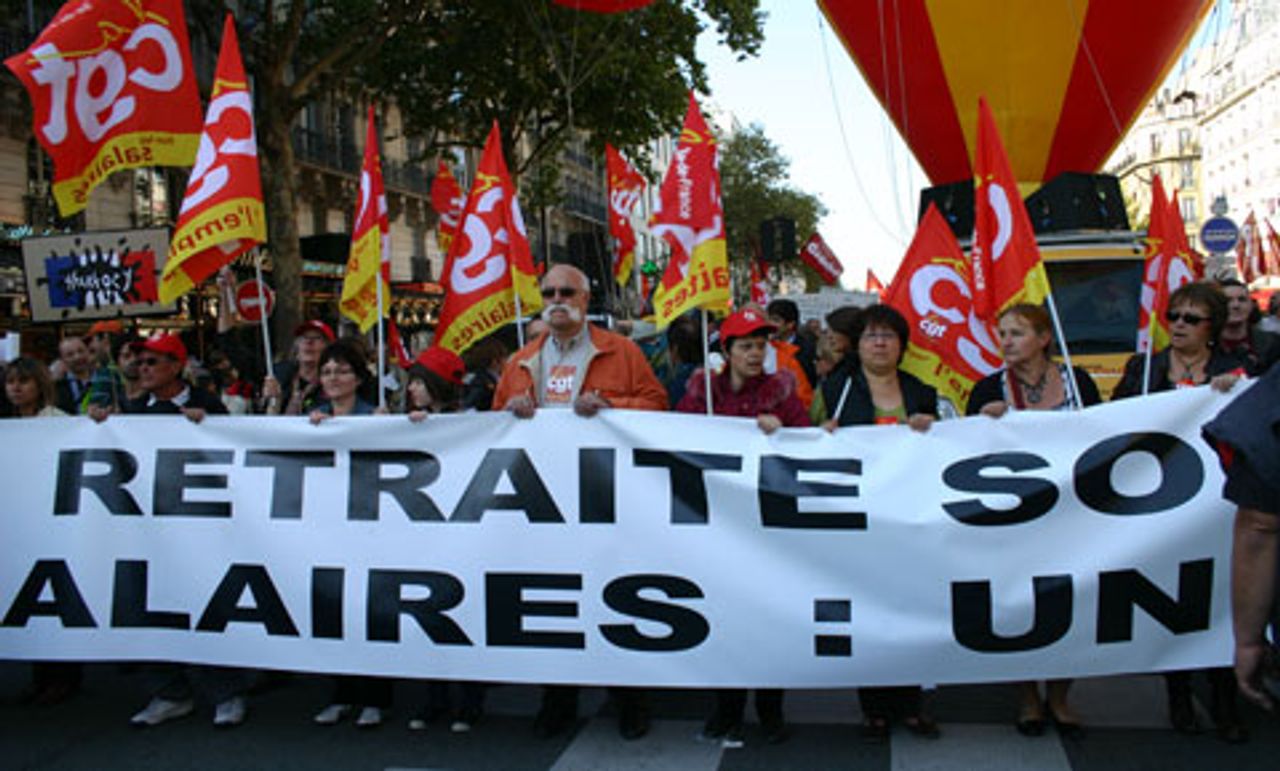On October 12, millions of workers and students took to the streets across France to protest against President Nicolas Sarkozy's pension cuts. Virtually every industrial area, in the private and public sector, went on strike. The trade unions estimated that up to 3.5 million protesters marched in 250 demonstrations throughout France.
 The march in Amiens
The march in AmiensThe October 12 protest was the fourth and largest action against pension cuts since the beginning of September. Another day of protest has been called for Saturday by the unions. The protest was called by France's main unions, notably by the Stalinist-linked CGT (General Confederation of Labour) and the Socialist Party-linked CFDT (French Democratic Confederation of Labour). Students participated in large numbers this time, with over 300 high schools going on strike.
The pension cuts include increasing the minimum retirement age from 60 to 62, and the age for retiring on a full pension from 65 to 67. The protests took place after the French Senate had already approved these two key measures; the debate on the entire bill will finish by the end of this month.
 The demonstration in Marseille
The demonstration in MarseilleThe economy is still threatened by an ongoing port strike in Marseille, which has left dozens of petrol tankers unable to offload, threatening fuel shortages. Eleven of mainland France's 12 refineries are affected. Some sectors have voted continuing strike action, including public transport and energy.
Despite the record turnout and mass public support—one poll found 69 percent support for the strikes—the government has pledged to stand firm. It is relying on the unions to prevent rising discontent and militancy in the working class from finding politically effective expression.
On October 13, Sarkozy ruled out any concession on the pension reform: “It’s normal that this reform makes some people unhappy. But in a few years, people will realize that we saved the pensions system.”
WSWS supporters intervened in several demonstrations around the country, distributing a leaflet titled “The struggle against social austerity requires a new socialist perspective.”
Demonstrators expressed their anger against the cuts and called for continuing the strikes until the government withdraws the bill.
In Marseille, dockers and agents of the autonomous port participated in the demonstration along with nurses and social security officials. Very few people came individually. WSWS supporters noted that people attended the demonstrations out of a feeling of obligation, sensing that one-day mobilizations would not suffice to halt the cuts.
 Eddie during the demonstration in Marseille
Eddie during the demonstration in MarseilleEddie, 18, a second-year engineering student, said, “I hope it’s possible to struggle against Sarkozy on social austerity. They have their arguments but we do too, and we are not heard enough. Sarkozy’s politics are based on police repression of individual cases.”
He explained, “Sarkozy wants to act with laws, but you have to go to the root of the problems. People are violent because they live in poverty. For retirement, he has the same policy as in other countries—but we have the highest fertility rate in Europe. There is no problem with preserving the pension system’s funding. Productivity has been multiplied by four and it is increasing. There’s money, but it has to go to the workers and to the pension system, instead of to stockholders.”
Olivier, 24, a computer science student, said, “The unions have been changing since the beginning of Sarkozy’s term. When there was the rail workers’ strike, the CGT called for an end to the movement. Then taxis or officials are attacked, and the unions do nothing; they don’t do their job. Today, we’re in a movement but we know the unions are going to chicken out on us like they did in the CPE [First Job Contract protests in 2006]. The government makes one step back then two steps forward. The unions give up right at the beginning.”
Olivier said it would be best to “throw out the union leaderships to have a union that really defends the interests of the people.”
A member of the Green Party commented: “To make Sarkozy back down, we need more people, and non-unionised people. I’m completely opposed to the anti-immigrant policies of Sarkozy, amongst other things. They hunt down the Roma for purely electoral reasons.”
 A section of the march in Paris
A section of the march in ParisIn Paris, high school students Hugo and Julien said they thought the government would not back down on the cuts. Despite the demonstrations and strikes against the reform of high schools, the government had pushed it through. They hoped to continue the strikes and “put the economy at risk.”
Davoux, a railway worker and member of the SUD unions, said, “Sarkozy is attacking our social gains, we must defend them. France is wealthy enough to fund retirements. The government is very firm in refusing to negotiate.
We have to extend the strike, so the government makes real concessions—the goal is to maintain the retirement age at 60. A general strike would force the government to negotiate. We must mobilize the private sector; the problem is that they fear being fired and losing wages when they go on strike.
In Amiens, over 10,000 people demonstrated. Nearly every high school in the city and surrounding towns was on strike along with thousands of students, some of them chanting: “To arms!”
Magid, a technician at Goodyear with 11 years’ experience, marched with his son. He said, “I’m not unionised, but I want the unions to organize a general strike. It can’t simply come from one workplace. The left and the PS are not planning to overthrow capitalism, and I’m against the nationalist vision of the CGT. A PS government would do the same as the [social-democratic government] of Greece: impose austerity to pay off the banks.”
